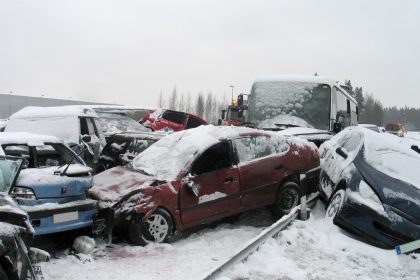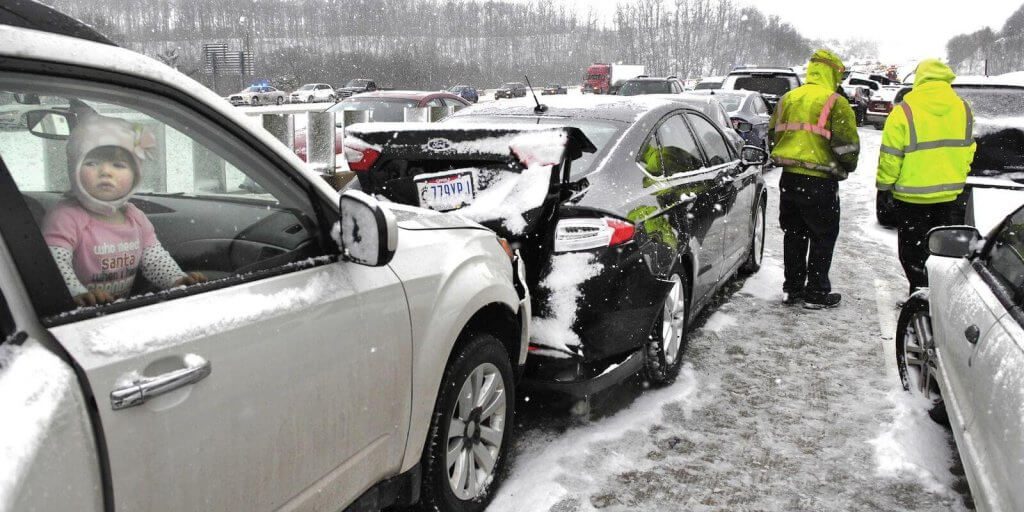
Having had cause to this morning in the snow I have noticed another major hazard aside from the weather – the way our fellow road users react to the dangers the weather throws at us.
There are two extremes and both equally as lethal as the other. The first, is the reckless driver who carries on regardless paying no heed to the conditions themselves or the numerous warnings. And the second, is the over cautious driver, driving much too slow and creating further dangers, despite their best efforts of trying to achieve the opposite.
FIRST THINGS FIRST – What should you do if you have an accident?
The very first priority goes without saying – make sure that all those involved in the accident are not injured. If there are injuries decide whether an ambulance should be called. The golden rule – if in doubt call for help!
WHAT MUST I DO – practical steps to take at the accident scene following an accident?
- Stay safe! Bearing in mind the recent weather conditions, falling trees, flooding and overturning trucks, make sure that you and all of the other people involved are out of harm’s way so that there will not be any further accidents.
- Be nice! Showing concern for an injured party does not mean that you are admitting you are at fault! A little kindness goes a long way!
- Call the Gardai immediately and report the incident. If the Gardai feel that it is unnecessary for them to attend at the scene the accident should still be formally reported to the Gardai and you should attend at your nearest Garda station after the accident to deal with this.
- Exchange contact details with not only the other drivers but anyone who witnessed the accident also.
- You should also gather as much information as possible as the scene:
o Name and Address of the Driver
o Name and Address of the owner of the car
o Name and Address of Witnesses
o Insurance Details
o Vehicle registration
o Details of the Gardai in attendance - If you are a bystander or a passer-by unless you can be of assistance you are likely to be more hindrance than help. Provide your details to the drivers at the scene or the Gardai but do not hang around to see how things pan out.
- If possible take photographs of the scene, the vehicles, the debris and road markings.
WHAT ARE THE DONTS!
Never admit liability at the scene. It is often a condition of insurance that liability is not admitted.
Do not move the vehicles unless absolutely necessary. Generally, the vehicles should stay as they stopped unless the Gardai advise otherwise. If it is necessary to move them make sure you obtain photographs of their positions on the road beforehand.
Never leave the scene of an accident. This is a criminal offence. Braving the recent elements will be necessary! Remain at the scene until the Gardai have confirmed you can leave.
Do not get angry! Getting irate at the scene can often serve to make things worse. Stay calm!
 After the initial shock – what’s next?
After the initial shock – what’s next?
Fess up! Inform your insurance company immediately. This should be done even if it is not your fault.
Keep a Note! Write down your account of what happened and how it happened. Don’t forget to include details of the road conditions that day. Make sure to keep all of your receipts for medical expenses and property damage.
Take photographs of your injuries to document them.
Finally, once the storm has settled watch the time! Remember, anyone who has suffered an injury following an accident only has two years to take a claim.
If you were involved in an accident that was not your fault and you feel you might be entitled to compensation the time to deal with it is now.
Featured Articles from Lynch Solicitors
Taking a Personal Injury Case – Stumbling Blocks
The scope for taking a Personal Injury case can be quite wide when you consider that it can include an accident at work, an accident in a public place, or a road traffic accident.
As well as that, the injuries can vary from a sprained ankle to serious head injuries and even can be fatal.
Read the full article by clicking here.
Have You Been Defamed Online? Can You ‘Dislike It’?
The Ana Kriegel case has once again highlighted the need for Defamation Law awareness after a boy was wrongly identified as one of the teenager’s killers, with his picture and personal details shared online and on various messaging apps.
While the internet and the use of social media has given us a world of content and freedom, with that comes the risk of defamation.
What can you do if you are defamed online?
Read the full article by clicking here.
All the time in the World – Statute of Limitations
The Statute of Limitations sets out the length of time a person has to make a claim as a result of an action or omission that gives rise to the claim.
Once the specified time has passed an action can no longer be brought.
The logic is grounded on common sense principles: after a certain length of time it is impossible to get accurate evidence – be it witnesses, people’s recollection etc. and the threat of legal action cannot hang over a person for an indefinite time.
Therefore, the law stepped in with the concept of the Statute of Limitations.
Read the full article by clicking here.
Time Limits in Medical Negligence
It is important to be aware that there are certain time limits in medical negligence within which a claim can be made. The Statute of Limitations is the length of time a person has to make a claim following an incident that gives rise to the claim.
The material contained in this blog is provided for general information purposes only and does not amount to legal or other professional advice. While every care has been taken in the preparation of the information, we advise you to seek specific advice from us about any legal decision or course of action.


nice article.thank
Thank you.
Thank you very much